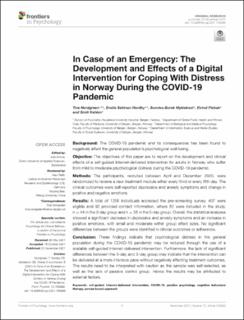In Case of an Emergency: The Development and Effects of a Digital Intervention for Coping With Distress in Norway During the COVID-19 Pandemic
Journal article, Peer reviewed
Published version

Åpne
Permanent lenke
https://hdl.handle.net/11250/2977065Utgivelsesdato
2021Metadata
Vis full innførselSamlinger
Sammendrag
Background: The COVID-19 pandemic and its consequences has been found to negatively affect the general population’s psychological well-being.
Objective: The objectives of this paper are to report on the development and clinical effects of a self-guided Internet-delivered intervention for adults in Norway who suffer from mild to moderate psychological distress during the COVID-19 pandemic.
Methods: The participants, recruited between April and December 2020, were randomized to receive a new treatment module either every third or every fifth day. The clinical outcomes were self-reported depressive and anxiety symptoms and change in positive and negative emotions.
Results: A total of 1256 individuals accessed the pre-screening survey, 407 were eligible and 92 provided contact information, where 82 were included in the study, n = 44 in the 3-day group and n = 38 in the 5-day group. Overall, the statistical analyses showed a significant decrease in depressive and anxiety symptoms and an increase in positive emotions, with small and moderate within group effect sizes. No significant differences between the groups were identified in clinical outcomes or adherence.
Conclusion: These findings indicate that psychological distress in the general population during the COVID-19 pandemic may be reduced through the use of a scalable self-guided Internet-delivered intervention. Furthermore, the lack of significant differences between the 5-day and 3-day group may indicate that the intervention can be delivered at a more intensive pace without negatively affecting treatment outcomes. The results need to be interpreted with caution as the sample was self-selected, as well as the lack of passive control group. Hence the results may be attributed to external factors.
